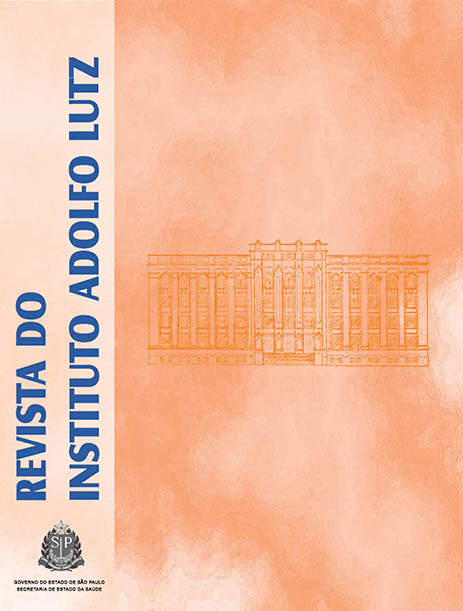Abstract
The associated use of the modified Middlebrook 7H11 agar thin layer technique and the Polymerase Chain Reaction (PCR) assay enabled to perform the early identification of microcolonies of Mycobacterium bovis from 12th to 25th day of culture. In order to reduce the time for performing the Mycobacterium bovis identification, the combined use of these two techniques was evaluated by analyzing the microcolonies of mycobacteria at the 8th day after culturing. Until the last day of analysis, all of the PCR-positive samples already showed the microcolonies. Therefore, the early diagnosis of bovine tuberculosis is feasible, without an apparent macroscopic colonies growth.References
1. Bermudez HR, Renteria ET, Medina BG, Hori-Oshima S, De La Mora VAV, Lopez VG, et al. Correlation between histopathological, bacteriological and PCR diagnosis of bovine tuberculosis. J Anim Vet Advances. 2010;9:2082-8.
2. Hosek J, Svastova P, Moravkova M, Pavlik I, Bartos M. Methods of mycobacterial DNA isolation from different biological material: a review. Vet Med-Czech. 2006;51:180-92.
3. OIE. Bovine tuberculosis. In: OIE. Manual of Diagnostic Tests and Vaccines for Terrestrial Animals. 2009. Chapter 2.4.7. 16p. Available from: [http://www.oie.int/en/international-standard-settin/terrestrial-manual/access-online].
4. Stewart LD, McNair J, McCallan L, Thompson S, Kulakov LA, Grant IR. Production and evaluation of antibodies and phage display-derived peptide ligands for immunomagnetic separation of Mycobacterium bovis. J Clin Microbiol. 2012;50:1598-605.
5. Marcondes AG, Shikama MLM, Vasconcellos SA, Benites NR, Morais ZM, Roxo E, et al. Comparação entre a técnica de cultivo em camada delgada de ágar Middlebrook 7 H11 e meio de Stonebrink para isolamento de Mycobacterium bovis em amostras de campo. Braz J Vet Res Ani Sci. 2006;43:362-9.
6. Stewart LD, McNair J, McCallan L, Gordon A, Grant IR. Improved detection of Mycobacterium bovis infection in bovine lymph node tissue using immunomagnetic separation (IMS) – based methods. Plos One. 2013;8:e58374.
7. Collins DM, Radford AJ, de Lisle GW, Billman-Jacobe H. Diagnosis and epidemiology of bovine tuberculosis using molecular biological approaches. Vet Microbiol. 1994;40:83-94.
8. Roxo E, Ikuno AA, Ferreira VCA, Harakava R, Ruggiero APM, Vialta A. Avaliação de diferentes protocolos de extração de DNA de Mycobacterium bovis a partir de leite. Arq Inst Biol. 2002;69 Supl:46.
9. Universidad de las Naciones Unidas. Nuevas tecnologias para el diagnóstico y pruebas de susceptibilidad a drogas de M. tuberculosis para países en vias de desarollo. In: Programa de Biotecnologia para Latinoamérica y el Caribe – BIOLAC. Red Latinoamericana y del Caribe de tuberculosis – RELACTB. La Paz (Bolivia); 1998:18-21.
10. De Kantor IN. Organización Panamericana de la Salud. Centro Panamericano de Zoonosis. Bacteriología de la tuberculosis humana y animal. Série de Monografias Científicas y Técnicas. 1998;11(1):63.
11. Bemer-Melchior P, Drugeon HB. Inactivation of Mycobacterium tuberculosis for DNA Typing Analysis. J Clin Microbiol. 1999;37:2350-1.
12. Rodriguez JG, Mejia GI, del Portillo P, Patarroyo ME, Murillo LA. Species-specific identification of Mycobacterium bovis by PCR. Microbiology. 1995;141:2131-8.
13. Beige J, Lokies J, Schaberg T, Finckh U, Fischer M, Mauch H, et al. Clinical evaluation of a Mycobacterium tuberculosis PCR assay. J Clin Microbiol. 1995;33:90-5.
14. Dib CC, Morais ZM, Souza GO, Amaku M, Benites NR, Pinheiro SR. Utilização de uma técnica rápida para o diagnóstico de Mycobacterium bovis em amostras de leite experimentalmente inoculadas. Arq Inst Biol. 2006;73:149-55.
15. Trabulsi LR, Alterthum F. Microbiologia. 5.ed. São Paulo: Atheneu; 2008.

This work is licensed under a Creative Commons Attribution 4.0 International License.
Copyright (c) 2012 Instituto Adolfo Lutz Journal
